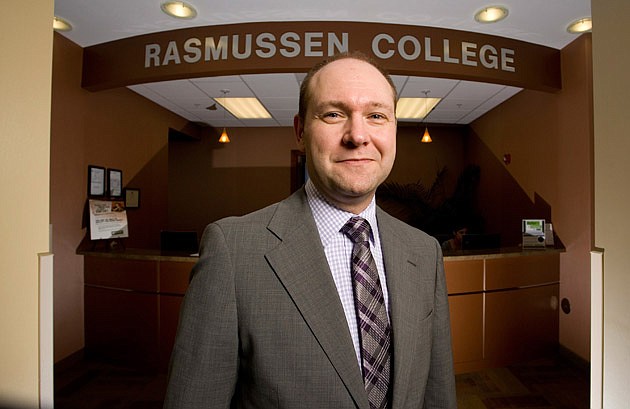Rasmussen College's customers aren't its students. The customers are employers. That focus has helped the college achieve high job-placement rates for the students it educates.
This is the time for colleges and universities to shine.
A lousy employment market means student enrollments are booming as students try to improve their chances of landing a job.
It's no surprise then that schools offering higher-education degrees are rushing into Florida, a state with one of the highest unemployment rates in the nation and relatively low percentage of college graduates. Among the new entrants is Rasmussen College, a Minnesota-based private for-profit school that moved into Florida by acquiring Webster College in Ocala with a campus in Pasco County two years ago. It has subsequently expanded to Fort
Myers and is scouting other campus sites around the state.
“I think of our customer as the employers and the students as our product,” says Eric Rasmussen, the college's regional vice president who oversees the three Florida campuses and its online efforts.
Rasmussen, no relation to the college's namesake founder, says the college can better help students land a job by focusing on what jobs employers need to fill now. For that reason, its student job-placement rates are well above 90% and it has 2,000 students scattered across its three Florida campuses.
Despite relatively high unemployment rates in Florida, some companies are still adding employees. “I think they're still hiring, but they're looking for specific skills and different degrees,” Rasmussen says.
What's more, Florida has relatively fewer college graduates than some other states. About 20% of the population of Florida has college degrees, compared with 30% in Minnesota, Rasmussen says.
For example, a genetic-testing company in Fort Myers recently approached Rasmussen to discuss training students for its fast-growing laboratory facility.
Because of the lack of biotechnology companies in the area, it has had to provide most training itself.
Rasmussen won't consider programs for lower-paying jobs. To measure its success in other ways, Rasmussen recently started calculating jobs' return on investment. That's because it wants to train students for jobs that pay well enough that students can repay their student loans within a reasonable time. At $365 per credit hour, including books, the cost of tuition is higher than public institutions.
For instance, Rasmussen eliminated a program to teach students how to code medical procedures for the insurance industry because it doesn't pay well enough for students to repay their student loans quickly.
“In the past, we'd eliminate based on demand,” Rasmussen says. Rasmussen opened its doors in 1900 as the Rasmussen Practical School of Business, catering to the need for secretaries and accountants and has spread to 17 campuses in Florida, Illinois, Minnesota, North Dakota and Wisconsin.
Rasmussen is also a leader in online education. Its sister company, Deltak Edu Inc., provides the online technology that powers 13 colleges such as Benedictine College, Loyola University and Utica College. Rasmussen has found that students like the flexibility of studying online at their leisure and having a physical campus where they can interact with professors and other students. Some courses such as nursing must have classroom space for practical instruction.
Because Deltak provides the online function for other universities, the company strikes deals with these partner universities to let Rasmussen students get a leg up on more-advanced degrees. For example, students who graduate with a bachelor's degree in business from Rasmussen can get their masters in business administration from Benedictine University in one year instead of two.
Unlike public institutions, Rasmussen is a private, for-profit business. So if employers don't hire the students the college graduates, the college won't be able to compete in the increasingly crowded higher-education field.
While Rasmussen won't discuss the college's finances, he anticipates 25% annual growth in students. “That's my expectation for the next few years,” Rasmussen says.
Because it offers four-year degrees, Rasmussen is more affected by the economic downturn than rivals that offer career-oriented programs that take less time to complete.
However, Rasmussen says the students have had little trouble obtaining federal grants and loans because the government has left many programs intact and even boosted spending. More than 90% of the students receive some financial aid.






